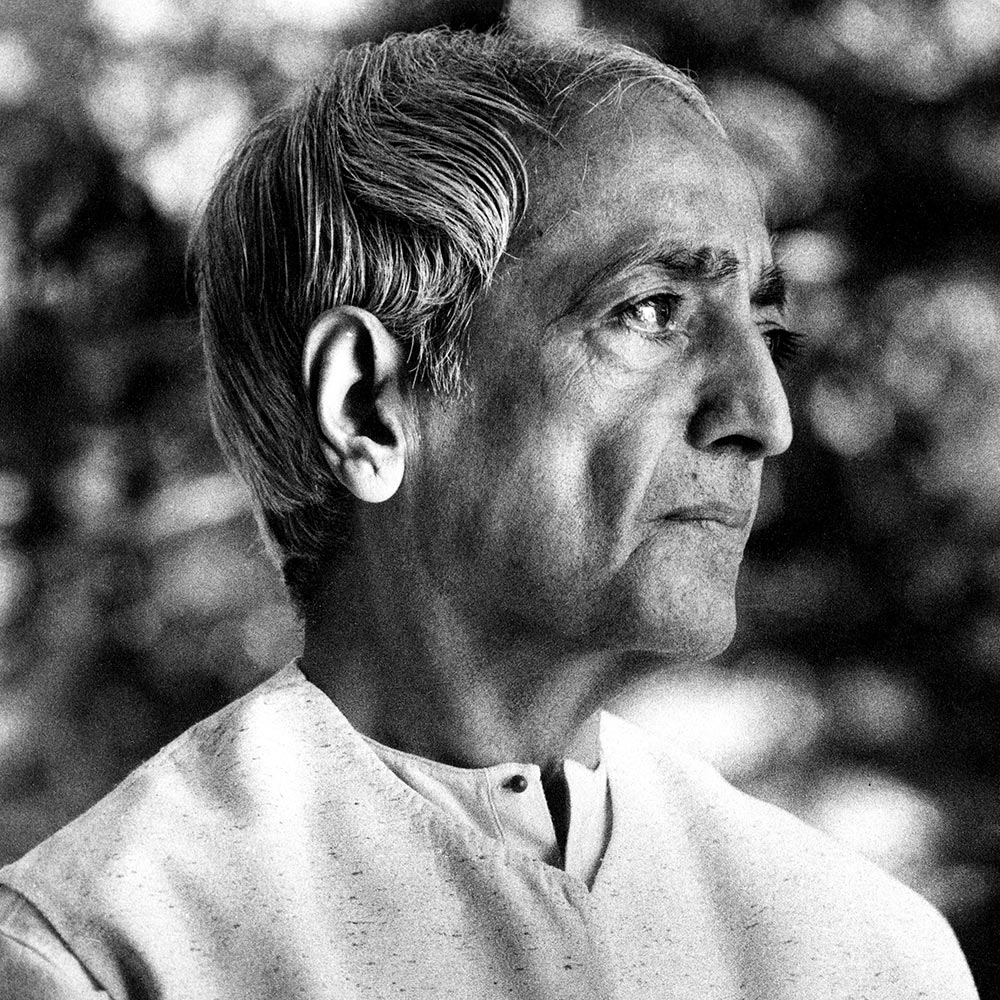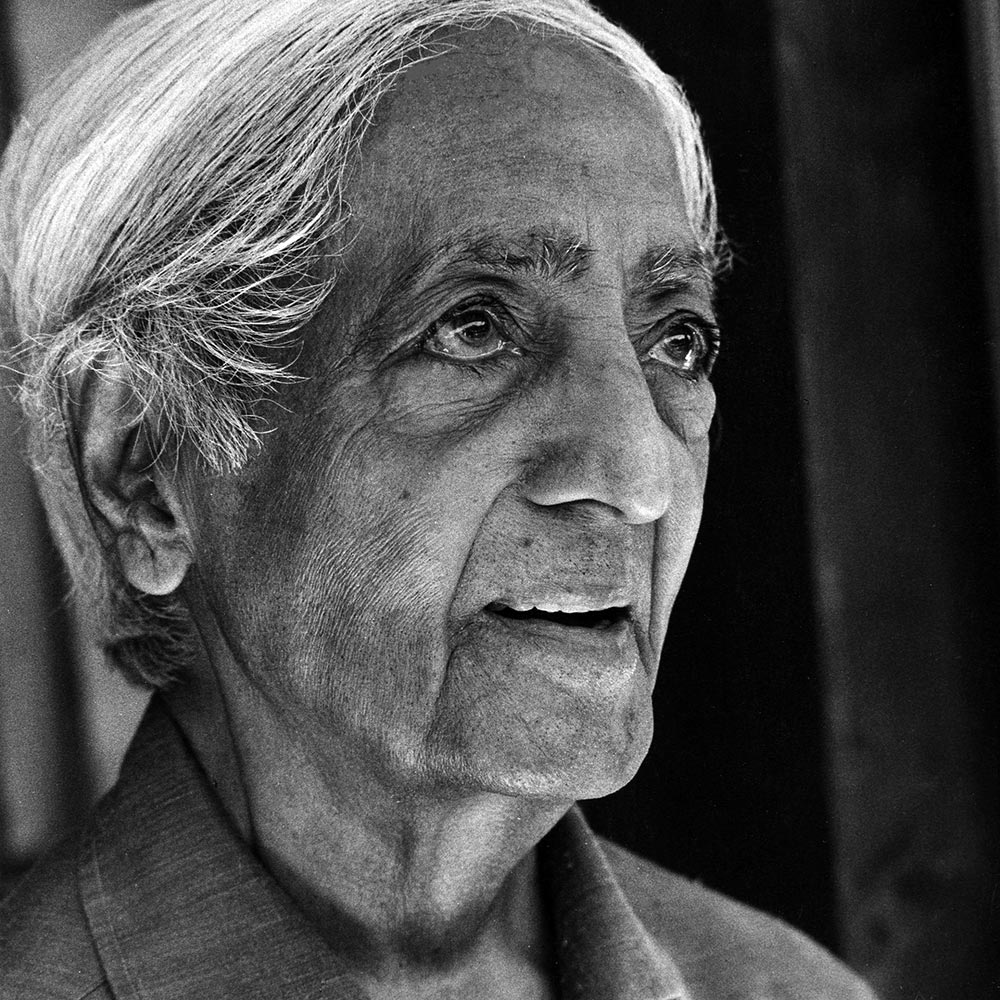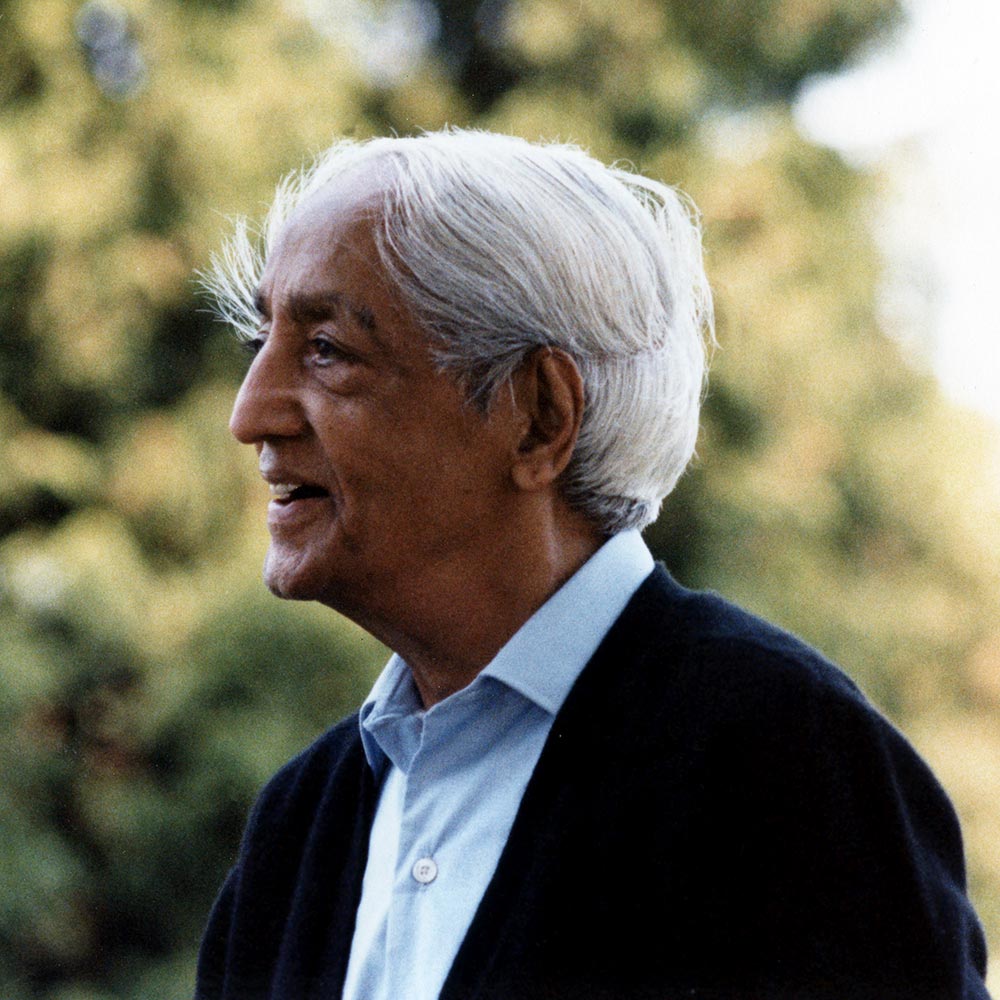
Krishnamurti’s approach to meditation is perhaps unique. It is certainly radical. It has been described as ‘techniqueless meditation’, eschewing the practices, goals and controls advocated by most teachers and traditions. Meditation, he says, is not something you do or experience, nor can it be learned from another. It is not concentration or contemplation. There is nowhere to get to, and movement of the mind in any direction, with any purpose, is not meditation but is time-bound, rooted in the known. Even simply being, the future and past banished, is questioned by Krishnamurti, since its base is a centre, a ‘me’.
Is meditation something divorced from everyday life? The peace of mind we wish to find is often a reaction, a step away from the facts of our life, our problems and worries. Krishnamurti suggests that meditation is directly related to our everyday activities, not something separate, and is only possible with order in our daily life. It is not the mindfulness practices commonly taught, the watching of the breath or repeating a mantra.
Krishnamurti’s approach to meditation is perhaps unique. It is certainly radical.
Krishnamurti saw each of his talks not as an imparting of information but itself a meditation, holding a mirror up to ourselves so that we can look accurately. In the very looking, with the corresponding entirely new action, is the actuality of meditation, which naturally comes when there is the understanding of the whole process of thought.
The following text and video extracts highlight Krishnamurti’s novel approach to meditation.
I am afraid the word ‘meditation’ has been so misused. There are so many systems of meditation – the Tibetan, the Chinese, the Hindu, the Buddhist – I don’t know what you mean by meditation. To me, meditation is something that cannot be cultivated or practised, following a system. It must come naturally, like a flower that blooms. You cannot force it.
From Krishnamurti’s Book TRUTH AND ACTUALITY

Meditation and Control
Meditation is a very complex business. The word meditation implies not only the brain concentrating on a certain subject but also a great deal of attention. But primarily meditation means to measure. The whole question of becoming is involved in it, which is to measure: I am this, I will be that. I am greedy, but I will gradually become non-greedy, which is a form of measurement, which is a form of becoming. Both becoming in the affairs of the world and psychologically becoming. Measurement is comparison, to compare what is with what should be, the fact and the ideal, the fact becoming the ideal. All this is implied in the word. Indian gurus have brought this word into the West and made a lot of money out of it. They are multi-millionaires. I have met some of them; they are appalling beings, all out for money.
To inquire into meditation, you have to inquire not only into measurement but also this constant becoming something, psychologically. Human beings are violent, and the ideal is to be in a state of non-violence, which is to become. Also in meditation is implied the meditator and the meditation. Who is meditating? In most systems of meditation, Japanese, Indian, Tibetan, and so on, there is the controller and the controlled. The controller tries to control thought, quieten thought, shape it according to a purposeful direction. Who is the controller? All this is implied in meditation, not merely to control one’s thought as is generally understood in meditation. Whether it is Zen meditation, or the most complex forms of meditation in India, there is always the director, the entity that controls thought. Psychologically, they have divided the thinker and the thought. The thinker separates himself from the activity of thought and therefore in meditation is implied the controller controlling thought to make thought quiet. That is the essence of meditation, to make the brain quiet.
So there is a division between the controller and the controlled. Who is the controller? Very few people have asked that question. They are delighted to meditate, hoping to get somewhere – illumination, enlightenment, quietness of the brain, peace of mind and so on, but very, very few have inquired into who is the controller. The controller is also thought. The controller is the past, is the entity or the movement of time as the past and measure. So there is the past who is the thinker, separate from the thought, and the thinker tries to control thought. Human beings have invented God out of their fear and try to reach God, the ultimate principle, Brahman, through meditation.
Who is the controller? Very few have asked that question.
So meditation is very, very complex. It is not just merely meditating for twenty minutes in the morning, twenty minutes in the afternoon and twenty minutes in the evening – which is like taking a siesta, not meditation at all. So if one wants to discover what meditation is, one has to ask: why does one have to meditate? One realises one’s brain is constantly chattering, constantly planning, designing – what it will do, what it has done, the past impinging itself on the present – it is everlastingly chattering, whether scientific chatter or ordinary daily life chatter. So the brain is constantly in motion. Now the idea of meditation is to make the brain quiet, silent, completely attentive, and in that attention find that which is eternal or something sacred. That is the intention of those who really have gone into this question. The speaker has gone into this for the last sixty years or more. He has discussed this question with Zen pundits, with Hindus, Tibetans and all the rest of the gang, and he refutes that kind of meditation because their idea of meditation is to achieve an end. The end being complete control of the brain so that there is no movement of thought. Because when the brain is still, deliberately disciplined, deliberately sought after, it is not silent. It is like achieving something, which is the action of desire.
So one has to ask also, if one is interested in all this, what is desire? Not to suppress desire, as the monks and sannyasis do, or identify desire with something higher – a higher principle, higher image, if you are a Christian identify with Christ and so on. So one has to understand desire if one wants to find out what meditation is.
Krishnamurti in Los Alamos, 1984
WATCH VIDEO

Meditation is one of the greatest arts in life, perhaps the greatest, and one cannot possibly learn it from anybody. That is the beauty of it. It has no technique and therefore no authority. When you learn about yourself, watch yourself, watch the way you walk, how you eat, what you say, the gossip, the hate, the jealousy, if you are aware of all that in yourself, without any choice, that is part of meditation. So meditation can take place when you are sitting on a bus or walking in the woods full of light and shadows, or listening to the singing of birds or looking at the face of your wife, husband or child.
Meditation cannot be learned from another. You must begin without knowing anything about it, and move from innocence to innocence. The soil in which the meditative mind can begin is the soil of everyday life, the strife, the pain and the fleeting joy. It must begin there and bring order, and from there, move endlessly. But if you are concerned only with making order, then that very order will bring about its own limitation, and the mind will be its prisoner. In all this movement, you must somehow begin from the other end, from the other shore, and not always be concerned with this shore or how to cross the river. You must take a plunge into the water, not knowing how to swim. And the beauty of meditation is that you never know where you are, where you are going, or what the end is.
Meditate alone. Get lost. And don’t try to remember where you have been. If you try to remember it, it will be something dead. If you hold on to the memory of it, you will never be alone again. So meditate in that endless solitude, in the beauty of that love, in that innocency, in the new. Then there is imperishable bliss.
Extracts From Krishnamurti’s Book MEDITATIONS
Video: The Story of the Master and the Stones
The Chattering Mind
Krishnamurti: Perhaps you and I can find out together what meditation is, so let’s go into it. You are not waiting for an answer from me so that you can be satisfied with words and explanations. What is meditation? Sitting cross-legged? Lying down, relaxed? There must be relaxation of the body, but though your body is relaxed, your mind is very active, chattering away. Being aware of this, you say, ‘I must control it, I must stop it, there must be a sense of quietness.’ So you begin to control your mind. You can spend years controlling, disciplining your chattering mind; your energy is spent making the mind conform to a desired pattern, but you don’t succeed. If you do succeed, your mind becomes weary, lethargic, empty, dull. Obviously, that is not meditation. On the contrary, the mind must be supremely alert, not caught in a routine of habit and discipline.
I see that my mind, chattering endlessly, cannot be disciplined, made to fit into a pattern of thought. Then how is it to be calmed? How is the chattering mind to be quiet? If we as an observer impose a discipline on the chattering mind, there is conflict between the observer and the thing observed. The thinker is struggling to make thought conform to the desired pattern, which is to calm the mind, so we discipline it, control, dominate or suppress, in which is involved the conflict of duality. Meditation is obviously not an endless process of conflict.
So, how is the mind to be quiet? When I ask that question, what is the state of your mind? Please watch yourself. What is the state of your mind when I put that question? You are accustomed to discipline, control, but now you see its absurdity, its illusory nature; so the state of your mind is that you do not know how to quiet the mind. You are finished with explanations, with knowledge, which is conditioning; the actual fact is that your mind is chattering and you do not know how to quiet it. So you are really inquiring, are you not? You are watching. You have no answer. All you know is your mind is chattering, and you want to find out how the mind can be quiet, but not according to a method. You know that your mind is active, ceaselessly chattering, one layer against another layer, the observer fighting the observed, the experiencer wanting more. You are aware of the incessant vagaries of thought, and you actually do not know how it is to be quiet. You reject all methods because they have no meaning. To follow a method, to copy a pattern only cripples the mind through habit. Habit is not meditation. The routine of a discipline does not free the mind so that it can discover the new. So, you reject all that completely, but you still have the question of how the mind is to be quiet.
How is the mind to be quiet?
The moment you put that question to yourself vitally, actually, what is the state of your mind? Is it not quiet? It is no longer chattering, analysing, judging; it is watching, observing, because you do not know. The very state of not-knowing is the beginning of quietness. You discover that as long as there is the struggle between the desired pattern and that which you are, there must be a battle; and this battle is a waste of energy which creates inertia. So the mind sees the falseness of all that and rejects it. As it observes, the mind becomes quiet. Yet there is still the problem of the thinker apart from thought, so there is again a battle.
Meditation is all this process, not just a limited process with a particular end. It is this vast searching, groping, not being caught in any idea, belief or experience, being aware that any projection of the mind is illusory. And if you go into it more and more deeply, not with a motive, not with any desire for a particular result, but simply watching the whole process of yourself, then you will see that without any form of compulsion, suppression or discipline the mind becomes creatively empty, still.
That stillness will not give you any riches in this world. If you approach meditation with a begging bowl, it will offer you nothing. That stillness is free from all sense of continuity; in it no experiencer is experiencing. When the experiencer is there, it is no longer stillness; it is merely a continuation of sensation.
Meditation is all this process, which brings about a state in which the mind is still, no longer projecting, desiring, defending, judging, experiencing. In that state, the new can be. The new is not to be verbalised; it has no words to explain it; therefore it is not communicable. It is something that comes into being when the mind itself is new; and this whole, complex process of self-knowledge is meditation.
Krishnamurti in Ojai, 1952
READ THE FULL TRANSCRIPT
Video: The Foundations of Meditation
Meditation Is…
Meditation is a movement in attention. Attention is not an achievement, for it is not personal. The personal element comes in only when there is the observer as the centre, from which he concentrates or dominates; thus all achievement is fragmentary and limited. Attention has no border, no frontier to cross; attention is clarity, clear of all thought. Thought can never make for clarity for thought has its roots in the dead past; so thinking is an action in the dark. Awareness of this is to be attentive. Awareness is not a method that leads to attention; such attention is within the field of thought and so can be controlled or modified; being aware of this inattention is attention. Meditation is not an intellectual process – which is still within the area of thought. Meditation is the freedom from thought and a movement in the ecstasy of truth.
Meditation is the unfolding of the new. The new is beyond and above the repetitious past – and meditation is the ending of this repetition. The death that meditation brings about is the immortality of the new. The new is not within the area of thought, and meditation is the silence of thought.
If you set out to meditate, it will not be meditation. If you set out to be good, goodness will never flower. If you cultivate humility, it ceases to be. Meditation is like the breeze that comes in when you leave the window open; but if you deliberately keep it open, deliberately invite it to come, it will never appear.
Imagination and thought have no place in meditation. They lead to bondage, and meditation brings freedom. The good and the pleasurable are two different things; the one brings freedom and the other leads to the bondage of time. Meditation is the freedom from time. Time is the observer, the experiencer, the thinker, and time is thought. Meditation is the going beyond and above the activities of time.
Meditation is the summation of all energy. It is not to be gathered little by little, denying this and denying that, capturing this and holding on to that; but rather, it is the total denial, without any choice, of all wasteful energy.
Meditation is opening the door into spaciousness which cannot be imagined or speculated.
Meditation is not individualistic, nor is it social, it transcends both, and so includes both.
Meditation is in the open; secrecy has no place in it. Everything is exposed, clear; then the beauty of love is.
